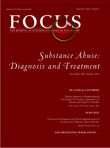Taking Account of Cultural and Societal Influences on Substance Use Diagnoses and Criteria
Abstract
Aims:
This article reviews the problems of cross-cultural applicability, which have been identified at the level of instrument items, at the level of criteria, and at the level of concepts and diagnoses. One near-universal appears to be that the diagnoses carry a weight of moral judgement and often of social stigma, whatever the clinician's intentions. Methods: The findings of studies on variations between cultures in the meaningfulness and meaning of the main substance use diagnoses and criteria are described. Results: Suggestions are made for directions of thinking and work to improve the cross-cultural applicability of five current diagnoses: intoxication, withdrawal, harmful use, abuse and dependence. Conclusion: It is argued that the possibility should be held open of bounded applicability of some diagnoses or criteria, in some societies but not in others.
(Reprinted with permission from “Diagnostic Issues in Substance Use Disorders” by American Psychiatric Publishing)



